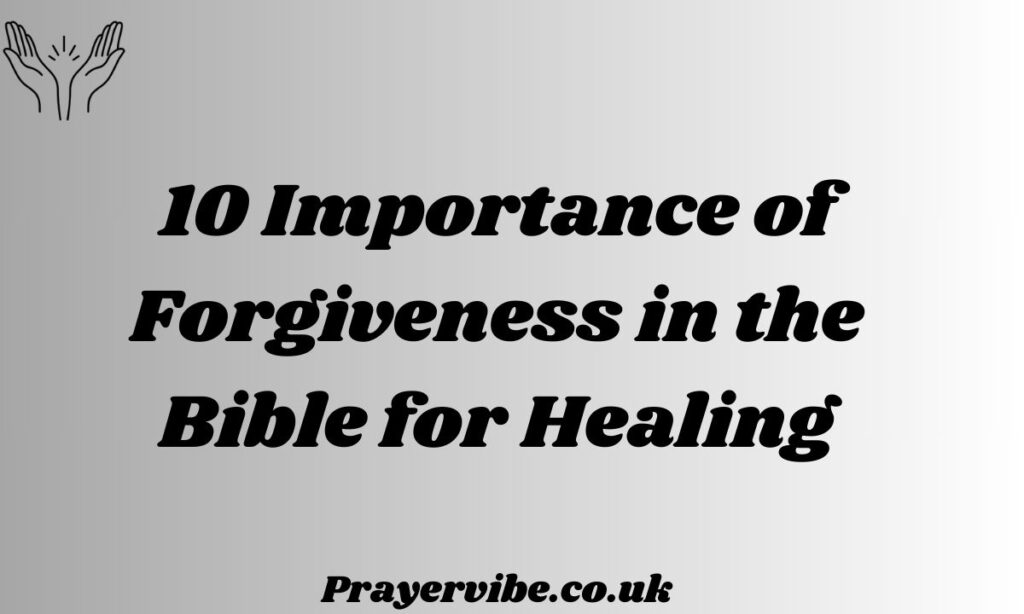Forgiveness stands as one of the Bible’s most powerful teachings for personal healing and spiritual growth. From Jesus’s words on the cross to the parables he shared, the Scriptures consistently emphasize forgiving others as essential to our own well-being.
The Bible shows us that holding onto grudges harms us more than those who wronged us. When we forgive, we mirror God’s forgiveness toward us, breaking chains of bitterness that prevent emotional and spiritual healing.
🙏 Divine Prayer Generator
Select a prayer category to begin
Forgiveness Reflects God’s Character
God forgives us completely when we repent. The Bible shows God as rich in mercy and compassion, revealing forgiveness as central to His nature. When humans forgive others, they reflect this divine quality in their own lives.
Scripture repeatedly illustrates God’s willingness to forgive, from the Old Testament promises of cleansing to Jesus’s parables about the forgiving father. This pattern demonstrates that offering forgiveness isn’t merely a good practice but mirrors the very essence of who God is.
It Leads to Personal Freedom and Healing
Refusing to forgive is like drinking poison and expecting someone else to die. The Bible teaches that holding onto resentment creates emotional and spiritual bondage. When we release others through forgiveness, we simultaneously free ourselves from bitterness.
This freedom opens the door to emotional healing and spiritual growth. Scriptures like Colossians 3:13 encourage believers to forgive as they have been forgiven, suggesting that forgiveness creates a healthy cycle of emotional liberation and restoration.
Forgiveness Restores Relationships
Forgiveness builds bridges where offense has created walls. Throughout scripture, reconciliation stands as a core value within God’s plan for human relationships. When we forgive those who have wronged us, we create possibilities for reconnection and renewed trust.
The Bible portrays a healthy community as dependent on mutual forgiveness. This restoration process may require time and boundaries, but scripture consistently presents forgiveness as the essential first step toward healing damaged relationships.
It’s a Command from Jesus
Jesus said, “Forgive, and you will be forgiven.” Christ’s teachings elevate forgiveness from suggestion to requirement for His followers. The Lord’s Prayer directly connects our receiving forgiveness with our willingness to forgive others. Jesus didn’t merely teach this principle—He demonstrated it by forgiving those who crucified Him.
His parables frequently highlighted forgiveness, including the unmerciful servant who received forgiveness but wouldn’t extend it to others. This consistent emphasis shows forgiveness as fundamental to Christian discipleship.
Forgiveness Brings Peace

Forgiveness plants the seeds of peace in the soil of conflict. Biblical wisdom connects the practice of forgiveness with experiencing God’s peace that “passes all understanding.” When grudges are released, space opens for tranquility within individuals and communities.
Scripture presents unforgiveness as a barrier to experiencing God’s perfect peace. By choosing forgiveness, believers align themselves with God’s peaceful purposes and create environments where reconciliation can flourish.
It Reflects the Gospel
Forgiveness mirrors the good news at Christianity’s core. Jesus died so our sins could be forgiven freely. When we forgive others, we demonstrate the same grace God showed us. This reflection of divine forgiveness in our human relationships makes the gospel visible and practical.
Scripture teaches that we love because God first loved us—similarly, we forgive because He first forgave us. This gospel-centered forgiveness creates harmony between our beliefs and actions, allowing us to experience the peace that comes from living consistently with our faith.
It Prevents Resentment and Anger
Forgiveness stops bitterness from taking root in our hearts. When we hold grudges, negative emotions accumulate and poison our thoughts. Choosing to forgive releases these harmful feelings before they can damage us. The Bible warns against letting the sun go down on our anger, recognizing how quickly resentment can grow.
Forgiveness acts as a protective barrier against this emotional toxicity. By letting go of grievances promptly, we maintain inner calm and protect our mental wellbeing from the corrosive effects of prolonged anger.
Forgiveness Enables Spiritual Growth
Forgiving others clears obstacles from our spiritual path. Holding onto hurts stunts our spiritual development and creates distance from God. When we forgive, we remove these barriers and create space for spiritual advancement. Scripture connects our willingness to forgive with our own spiritual health and maturity.
As we practice forgiveness, we develop Christ-like character and deepen our relationship with God. This spiritual progress brings increasing peace as we align more closely with God’s heart and purposes.
It Brings Joy and Contentment

Forgiveness replaces inner turmoil with genuine happiness. The weight of unforgiveness drains our capacity for joy. When we choose to forgive, we reclaim our ability to experience life’s goodness fully. The Bible associates forgiveness with restoration of joy and contentment in our daily existence.
This renewed joy isn’t dependent on circumstances but flows from an unburdened heart. By releasing others through forgiveness, we simultaneously release ourselves to experience deeper satisfaction and emotional freedom in all areas of life.
It Prepares Us for Heaven
Forgiveness aligns our hearts with heaven’s values now. In eternity, no unforgiveness will exist—only perfect peace and reconciliation. When we forgive, we practice living by heaven’s standards in the present. Jesus taught that the merciful will receive mercy, connecting our forgiveness of others with our eternal relationship with God.
By embracing forgiveness, we cultivate the character needed for our heavenly home. This eternal perspective brings peace by assuring us we’re becoming who God designed us to be.
Frequently Asked Questions
How can I forgive someone who doesn’t ask for forgiveness?
Forgiveness is a personal decision that benefits you regardless of the other person’s response.
Does forgiveness mean forgetting what happened?
Forgiveness means releasing resentment, not erasing memories or ignoring appropriate boundaries.
Is forgiveness a one-time action or ongoing process?
Forgiveness often requires an initial decision followed by an ongoing commitment to release recurring negative feelings.
Should I forgive if the other person might hurt me again?
Forgiveness doesn’t require placing yourself in harmful situations; you can forgive while maintaining healthy boundaries.
How do I know if I’ve truly forgiven someone?
You’ve truly forgiven when you can think of the person without resentment and genuinely wish them well.
Conclusion
Biblical forgiveness brings profound peace by aligning us with God’s character and freeing us from the prison of bitterness. When we forgive, we experience liberation from emotional toxins that damage our wellbeing and relationships. This divine pattern of forgiveness creates space for reconciliation, healing, and spiritual growth.
The peace that flows from forgiveness transforms both our present experience and eternal destiny. By embracing forgiveness as a lifestyle, we cultivate joy, strengthen our relationship with God, and prepare ourselves for heaven’s perfect harmony.

Daniel Miller is a passionate writer, SEO expert, and blogger, specializing in Bible verses, prayers, and faith-based content at PrayerVibe.







